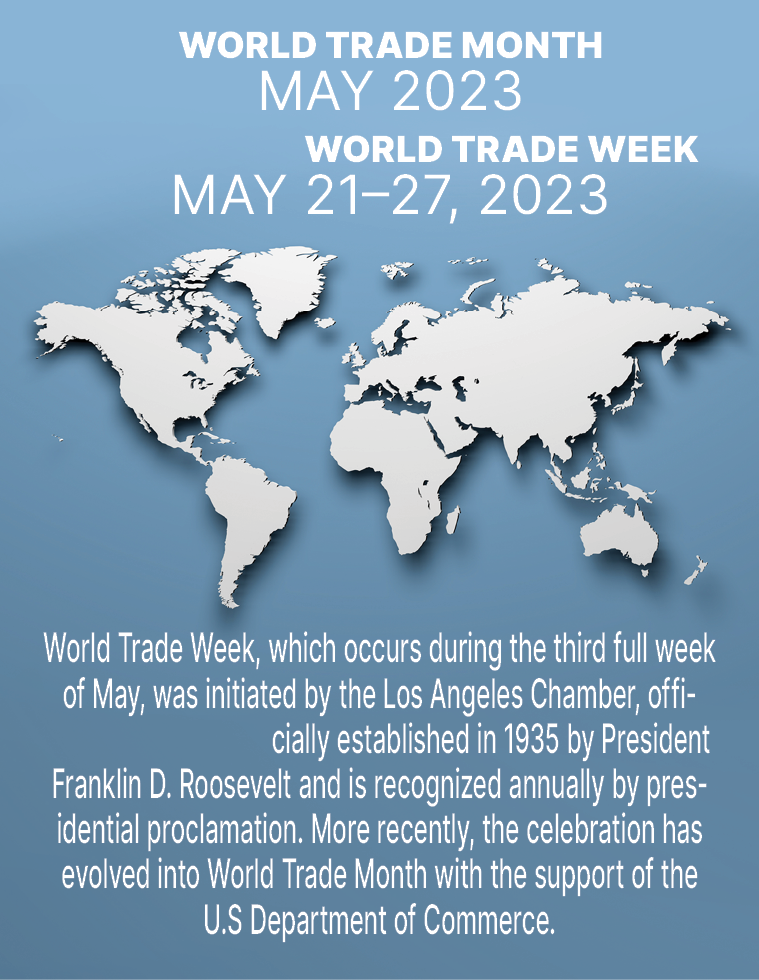
In a post-pandemic era, the world’s economic outlook is full of mixed messages. The World Trade Organization (WTO), International Monetary Fund (IMF), World Bank and the U.S. Department of Treasury are not in sync on a global outlook. Despite this, all agree on the importance of trade for economic growth.
For World Trade Month this May, the California Chamber of Commerce underscores the significance of international trade in maintaining economic growth. World Trade Month activities each May provide many opportunities to acknowledge the importance of global trade to the economies of California and the United States.
To obtain this economic growth, more and more business and agricultural groups are calling on the Biden administration to approve trade promotion authority and enter into more free trade agreements.
Extending trade promotion authority so that the President of the United States may negotiate new multilateral, sectoral and regional trade agreements would ensure that the United States may continue to gain access to world markets, resulting in an improved economy and additional employment of Americans.
Trade Promotion Authority
With more than 30% of U.S. gross domestic product (GDP) tied to international trade and investment and 95% of the world’s population abroad, representing 80% of the world’s purchasing power, U.S. engagement in the international marketplace is more important than ever to the nation’s economy.
Passage of trade promotion authority will help Congress and the President to work together to forge new and beneficial trade agreements for the United States. Congress needs to renew trade promotion authority to enable the United States to continue pursuing new trade deals aggressively.
Without trade promotion authority, the United States will be compelled to sit on the sidelines while other countries negotiate numerous preferential trade agreements that put U.S. companies at a competitive disadvantage.
By approving trade promotion authority, Congress can help strategically address the range of possible U.S. trade negotiations: a U.S.-United Kingdom Free Trade Agreement (FTA); a U.S.-European Union FTA; a U.S.-Kenya FTA; and even a possible re-admission to the Trans-Pacific Partnership (TPP) — now Comprehensive and Progressive Agreement for Trans-Pacific Partnership (CPTPP) — as well as other future trade negotiations.
California
California is the fifth largest economy in the world with a gross state product of more than $3.5 trillion. International trade and investment are major parts of our economic engine that broadly benefit businesses, communities, consumers and state government.
California’s economy is diverse, and the state’s prosperity is tied to exports and imports of both goods and services by California-based companies, to exports and imports through California’s transportation gateways, and to movement of human and capital resources.
The CalChamber supports expansion of international trade and investment, fair and equitable market access for California products abroad, and elimination of disincentives that impede the international competitiveness of California business.
California exports reached a record high in 2022, with companies exporting $185.55 billion worth of goods to the world. As usual, computer and electronic products made up the bulk of exports at 22.4% ($41.59 billion). Nonelectrical machinery and chemicals made up 11.7% and 9.5% of total exports, respectively.
California’s top five export markets remained the same in 2022; in order: Mexico, Canada, China, Japan and South Korea.
There was some shuffling with the next five export partners to round out the top 10. Taiwan remained California’s sixth largest export partner, but the Netherlands took over the seventh place, followed by Germany, India and Hong Kong, which moved down from ninth to 10th place.
U.S.-U.K. Free Trade Agreement
The CalChamber believes in strengthening economic ties and enhancing regulatory cooperation through agreements with our top trading partners that encompass both goods and services, including financial services, is essential to eliminating unnecessary regulatory divergences that may act as a drag on economic growth and job creation.
The United States maintains a deep trade and investment relationship with the United Kingdom, which officially left the European Union on January 31, 2020. Now that the two countries are in a position to enter into a formal free trade agreement, negotiations for a U.S.–U.K. FTA should be underway.
The CalChamber supports the goal of strengthening the trading and investment relationship between the two countries, with a focus on securing open market access, and further supports the following issues being discussed during negotiations:
• market access for goods;
• data protection and data transfers;
• financial services;
•·intellectual property rights;
• movement of labor; and
•·regulatory cooperation.
Two-way trade between the United States and the United Kingdom was $141.31 billion in 2022 and the U.K. was the fifth largest importer of U.S. goods with a total value of $77.3 billion.
In 2022, exports from California into the United Kingdom totaled $4.689 billion, while imports into California from the United Kingdom were approximately $4.125 billion. Top export categories included: computer/electronic products, chemicals, nonelectrical machinery, and transportation equipment. Top import categories included: transportation equipment, which made up more than 25% of the total, followed by computer/electronic products, nonelectrical machinery, reimports, and chemicals.
The U.S. Department of Commerce describes the U.S.-U.K. investment relationship as the largest in the world, creating more than 2 million jobs, about 1 million in each country.
In California, the No. 2 country for foreign direct investment is the United Kingdom (2022 statistics). British companies in California provide more than 94,601 jobs through 2,358 firms — amounting to $9.36 billion in wages.
The top jobs by sector are professional/business services, manufacturing, retail trade, leisure/hospitality, information, transportation/warehousing/utilities, financial activities, and wholesale trade.
U.S.-Kenya Free Trade Agreement
The CalChamber supports stable and sustainable economic growth and development in sub-Saharan Africa and supports the United States seeking to facilitate market-led economic growth in, and thereby the social and economic development of, the countries of sub-Saharan Africa.
In particular, the CalChamber is supportive of the United States seeking to assist sub-Saharan African countries, and the private sector in those countries, to achieve economic self-reliance. A trade agreement between the United States and Kenya would be the first agreement between the U.S. and a sub-Saharan African country.
A U.S.-Kenya trade agreement also would complement Africa’s regional integration efforts, which include the landmark African Continental Free Trade Area (AfCFTA). From its location on the eastern coast of Africa, Kenya serves as a gateway to the region and a major commercial hub that can provide opportunities for U.S. consumers, businesses, farmers, ranchers and workers.
Global Leaders in International Trade
The CalChamber believes that California’s position as a global leader in international trade should be considered and asks the administration and Congress to continue to advance bilateral, regional and multilateral trade agreements which are critical to consumers, workers, businesses, farmers and ranchers.
In addition, the United States should reinvigorate efforts to establish free trade agreements with partners that share our trade philosophy, including the European Union, the United Kingdom, and others. These markets offer new access opportunities for U.S. products and creating these alliances would ensure the U.S. can maintain its position as a major exporter.
Susanne T. Stirling is vice president of international affairs for the California Chamber of Commerce.


